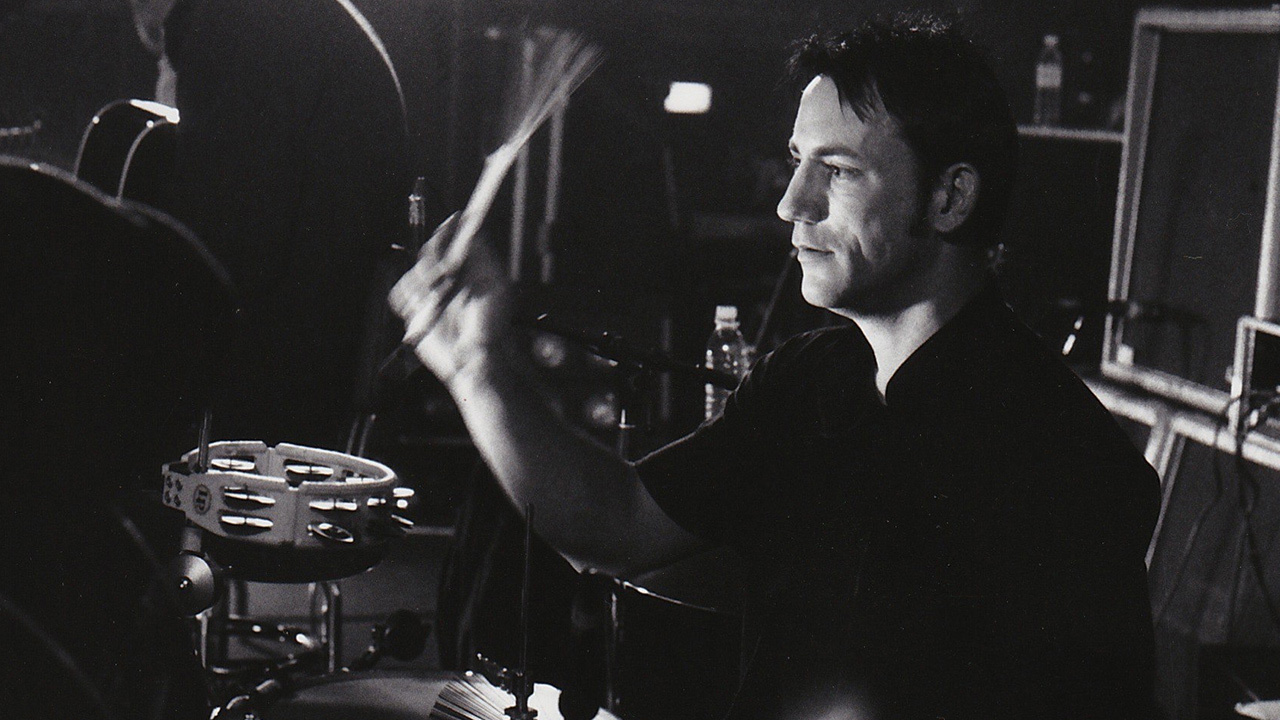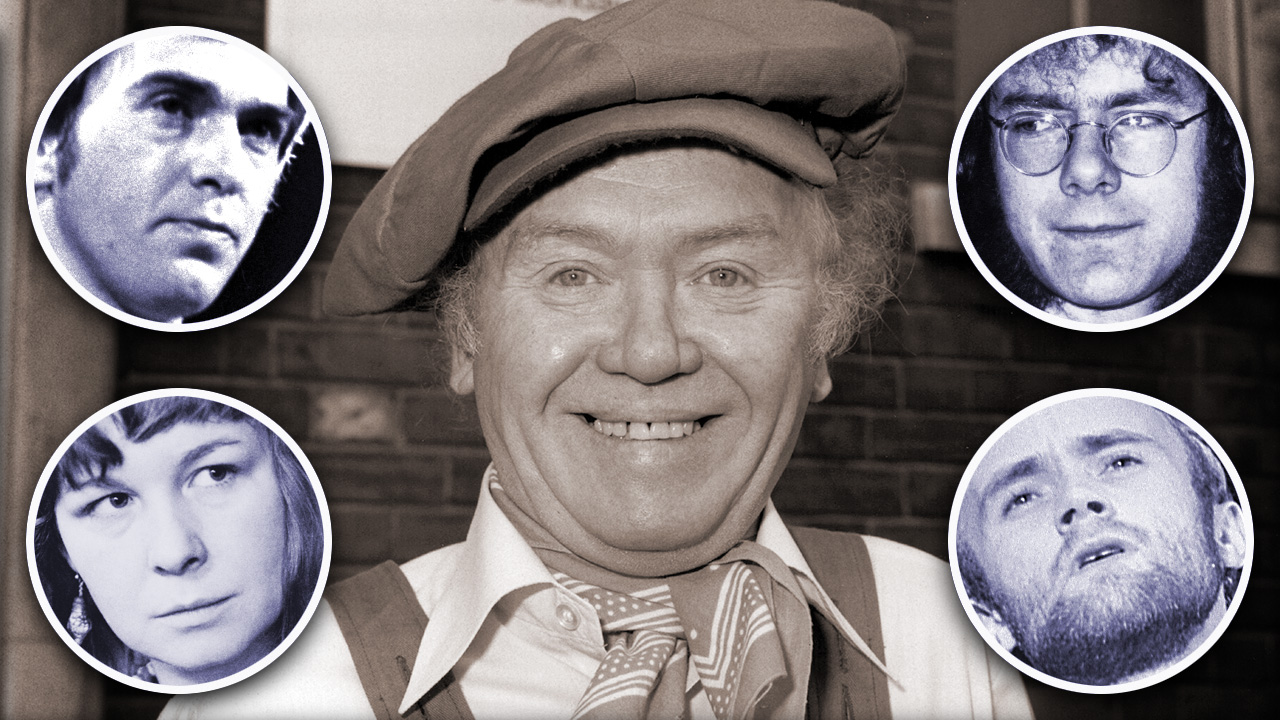Smashing Pumpkins drummer Jimmy Chamberlin shares his drum secrets
As we gear up for the London Drum Show, Smashing Pumpkins drummer Jimmy Chamberlin joins Rhythm Magazine to discuss the show, rock'n'roll and his place as one the best sticksmen in the world

For the last couple of decades at least, no ‘Greatest Drummer’ list compiled by this or any other magazine has been complete without Jimmy Chamberlin somewhere very near the top. The jazz-schooled sticksman, who cites his influences as Krupa and Rich as much as Moon, Paice and Bonham, created some of the most intricate, memorable and hooky drum parts ever laid down in the name of rock. Cherub Rock, Geek USA, Siva, I Am One, Tonight, Tonight… the intricate, jazz-inspired beats Chamberlin laid down for Smashing Pumpkins in the 1990s set a benchmark for modern drummers; no player since Bonham and Baker has brought such finesse and chops to bear on rock music, and truly fired drummers’ imaginations. In the intervening years he has been on-off with Smashing Pumpkins frontman Billy Corgan, first in Zwan and then back with the Pumpkins on numerous occasions – including recently to tour with the band.
“[Billy Corgan] found himself in the position of just not having a drummer for the tour and he wanted to play the set that we’re going to play so he just reached out on email and said before he goes looking for someone to play those songs, which is obviously a long task, was there any way I could go out for this tour?” Chamberlin told Rhythm. “It’s very exciting to go back and celebrate that music in a great context. It is embracing the friendship, the relationship and the music and proving that the music and the relationships are much bigger than all the politics from down the years. I thought about it for about a second and then said yes.”
There are strong rumours of an original line-up reformation of the band, which of course would involve Jimmy, and possibly a new album – the prospect of which is something rock fans are particularly rabid for. His work with his own project, the Jimmy Chamberlin Complex, has also given drummers something to really love him for… and he also reveals that he’s just finished up working on another album with his drum-centric, jazz-rock fusion-esque band. So, when Rhythm was considering just who we could bring to 2017’s London Drum Show, naturally his name was first to come up. The show will be an excellent and rare chance to see a Chamberlin clinic performance in the UK, and as we talk with Jimmy ahead of what we’re certain will be a jaw-dropping LDS performance, we soon realise that the drummer is as masterful in his thoughts on the art of drumming as he is incredible behind the kit.
What was it that first sparked your love of drumming?
“My dad was a clarinet player so we listened to a lot of big band music in the house. My dad was a big fan of Gene Krupa, Cozy Cole, Sonny Greer, Papa Jo and those guys. He was born in 1925 so he grew up in the glory days of swing music. I’m also the youngest of six brothers and sisters. I was born in ’64 so I saw the music change pretty significantly to Beatles-type stuff to the ’70s progressive metal, hard rock and fusion. My brother Paul is also a drummer, so by the time I was six or seven we had a drumset in the house. My first interest in drums was just as a little brother trying to emulate his elder brother. I fell in love with the regiment of practising and whenever my brother wasn’t playing his kit, I was playing his kit.”
What was your introduction into drum education?
“I was introduced to one of my brother’s contemporaries who was Charlie Adams who went on to play with [Greek-born musician/composer] Yanni. He was accomplished as a drummer even at that age, which was 18 or 19 and he lived a few streets over from me, so at eight years old I started studying with him. He took me through the basics. He sparked a lifelong love of learning within me, that is a blessing that he gave me. After he moved away, I found another teacher and got into more of the swing kind of technique. My final teacher was this guy who was a timpanist who was really into studying music from Trinidad and Brazilian music. I studied with him for maybe a year. By the time I was 15 I was playing regularly and started gigging.”
The latest news, features and interviews direct to your inbox, from the global home of alternative music.
How much of an impact did those early lessons have on your style?
“From a technical standpoint it laid a great foundation before I could articulate what I wanted to later on. Just having a knowledge of the mechanism of practising and how to do it. Also, an idea of how long it takes to get something and master it. That is where a lot of people get it wrong – they don’t give themselves enough time to master something, even something as simple as a paradiddle or a single-stroke roll. I continue to work on that stuff today and try to make it better, you never really master it. You might master it to a certain degree, but everyone’s single strokes are different. You need to realise that throughout your life, drumming will remain a long arc of practise, completion and some type of resolution. Realising that allows us to continue to learn with patience.”

What attributes do you need to be a great drum teacher?
“It’s a real knowledge of the mechanics. Education is a great way to save people time; that’s what I love to do in my clinics. I try to offer students a way to speed the process up and save them from making some critical errors that I’ve experienced or that I’ve seen other people experience. It’s just storytelling, it’s a passing along of wisdom that you have garnered. Some great players don’t make great teachers and some great teachers aren’t great players. Some teachers feel that they weren’t meant to be players and in themselves they always felt they were more like educators.”
You mentioned your clinics, do you remember your first ever?
“I remember my second clinic, it was PASIC. I had to play before Peter Erskine [laughs]. I remember he was in the audience and I remember the look on his face when my eyes met his as I was in the middle of my solo. At the beginning, clinics are nerve-wracking experiences. There is the feeling that you are under the microscope and there is the pressure of having however many drummers in the audience who are all breaking apart what you’re doing and also your inconsistencies. But once you get your head around that you realise that is part of the learning process as well. It’s about making choices and when you see someone play something correctly or incorrectly it is still information and you are making the choice to assimilate that or not. I feel that with clinics there is always learning to be had.”
How has your approach to clinics changed over the years?
“In the early days of my clinics it was just me playing along to a lot of music and not really having much to say. As I got more comfortable with the mechanism of it I got more into it; a lot of guys can play and I think I can demonstrate a good portion of my identity in not too much time. With 40 minutes of music I can show you what I’m about, but I also like to spend time talking about ideology, philosophy, what it takes to create an identity behind the instrument, how do we quantify the value of our experience and how we set ourselves up for success. Today, you can try to quantify success by money or how many records someone played on, but in music we should measure success in terms of how much joy we are getting from something. That is what I try to look for, I look for what my motivation is for doing something and how much it is contributing to my own personal growth. Once we can wrap our heads around that, and what the parameters look like for ourselves, we can start to participate in successful day-to-day practising and gigs.”
- Drummer Terry Bozzio talks Zappa, Beefheart, and that massive drumkit
- Our TeamRock+ offer just got bigger. And louder.
- The Audio Archive – exclusive to TeamRock+ members
- The 5 best punk drummers of all time, by Kye Smith
Is that an important factor to stress to young players, that success can be measured in many different ways?
“A lot of guys who look successful on paper are fucking miserable! There’s a lot of big artists out there who do nothing but complain and then I look at somebody like my brother who plays in four or five different lounge bands. He’s 64 and he can’t stop taking about how great his gig was or how he’s learnt something new the night before. I try to make people aware that there are many levels of success. If we are compassionate with ourselves and allow ourselves to define the parameters of what we see as successful then we can move in that direction without outside yardsticks and having to deal with the narcissism of the every day world that we live in. Letting people off the hook is a good way to teach. Letting people know that the destination of music is self expression is important and that the reason that we practise the drums is for us to get what is in our heart out onto the canvas. That should be the only reason that we practise. There’s a lot of people out there who can do it with very few brush-strokes. Charlie Watts is one of the most recognisable drummers out there and he does it with very few brush-strokes. Then you have someone like Vinnie [Colauita] who obviously articulates in a very different manner, but the destination is the same. They both have feelings they need to articulate and get out onto the drumset, they just have a different mechanism. That doesn’t mean that one is right and one is wrong or that one is better than the other. It’s all self expression.”
You’re one of the headliners of this year’s London Drum Show – what kind of message do you like to put across during such a performance?
“I like to lean on the educational part of it and leave people with a little wisdom. I also like to leave people with the self-assuredness that whatever choices they make, as long as they are based in altruism and honesty then they are the right choices. The main thing for young drummers is to forge their own path. Those that have gone before us, it is those that have forged their own path that are the most memorable – Tony Williams, Elvin Jones, those types of people that have gone on to change the face of drumming. Those people were able to articulate what was inside them in a pure way, I want to hear more of that from young drummers. I see YouTube has allowed for a lot of mimicry where 10-year-olds have chops for days and if you put them on a stage they can demonstrate these drum acrobatics, but what is the true destination? I’m not bagging on that type of drumming because I think it’s great and it has a purpose, but I think as drummers and musicians we need to come to grips with why we are doing what we’re doing and not just the how and what. That is what I want to get into. The great thing about Tony was that there was a reason why he made those choices and the reason wasn’t just because he could do it. It was because of what the music dictated. It ended up being a representation of his feelings and the drumming was super sophisticated, but then I just listened to ‘Maiden Voyage’ with him on the drums and he is playing so sparse and behind the beat, it is a part of the narrative of the music and you can tell that is more of the drummer that he was, rather than any drum wankery.”
Do you see education as an ongoing experience, even at the stage of your career that you’re now at?
“Being with the Pumpkins and having been with Yamaha through the days of Vinnie, Peter, JR and Weckl and all of those guys, I was really fortunate to talk to those guys. There are so many drummers I would love to be able to sit with and talk to for a year. I would love to compartmentalise 20 years of my life and just binge on drum lessons, but I have two kids and a business [Jimmy is CEO of tech company LiveOne] so my time very much gets compressed. I love to sit down with young drummers and see what they’re on about. It is always a learning experience. The last time I did the London Drum Show it was with Gregg Bissonette, Terry Bozzio, Thomas Lang; it was amazing. I remember doing that and being completely nervous about playing with those guys. What was amazing about the experience, beyond meeting Bill Bruford which was another level of, ‘Holy…!’, but the compassion that those guys showed for each other was amazing. Everybody in that circle knew that only they could do what they did. We all took a turn playing Bozzio’s drumset and we all failed miserably. We all did our thing and at no point was there any competition, everyone was cheerleading for all the other drummers and that is what creates the best teaching environment, when there’s preconceived notions, there’s no self-consciousness and it just becomes a free expression of identity. To have an environment like that where everybody has your back, and for the crowd too, that is a great teaching moment.”
Is London a city that you have fond memories of from previous shows?
“It is always a great experience. The people are so receptive and kind. The UK’s had a major contribution to the music industry. All the rock drummers I liked as a kid came from England, so it has an imprint on me. Aside from music, London has a great vibe.”
What do you have coming up beyond the show?
“I’m doing a few jazz gigs. I’ve recorded some more music for the Jimmy Chamberlin Complex. We reconfigured the band to a straight-ahead quintet and I’m excited about that. I’ll be practising a ton as well. I’m always trying to evolve. We’re talking about maybe recording next year with the Pumpkins and I want to make sure [if that happens] that I bring some really different stuff to the table. The purpose of this sabbatical needs to be revealed in the music. I’m counting on everyone bringing some new shit to the table that is representative of the chance-taking that we’ve always done.”
The London Drum Show 2017 is running in association with Rhythm Magazine on the 11-12th November. For more information, head to their official site, or check out their Facebook and Twitter pages.
The London Drum show 2017 announces first artists
11 drummers who look like they've remembered a sad film
10 things you might not know about Green Day drummer Tré Cool
Rich Chamberlain has written for Classic Rock, Musicradar.com, Total Guitar, Nuts, FourFourTwo, Billboard, Classic Rock Presents The Blues and Classic Rock Presents Country.

